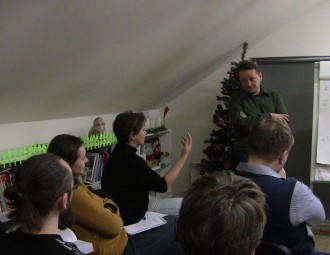Let’s play, Masters, shall we?

The Flying University started new season with a game. The educational program promises to be extremely creative.
What will new academic year be notable for, Tatsiana Vadalazhskaja, the methodologist, candidate of sociological sciences, and coordinator of the Flying University told to the “EuroBelarus” Information Service.
- New season started quite unusually – with the game. Why?
- This year it started quite late. It is related to rethinking of what are we going to do next. And the most visible result of that rethinking was the establishment of the School of Masters of Game. They are designed for giving answers from the different perspective to such questions as education and modern man, who has to relate to the modern world, change it, take responsibility for it, and so on. And in this search of a new man, in search of form and content of his/her education the ideas of these schools emerged. When being deep in thought about this man we named him/her Homo ludens – a man that plays, trying to give answers through this perspective.
It wouldn’t be worth starting the year with some ordinary lessons, so we decided that the Homo ludens schools should open with the game. And such game did happen, which encourages and provides an impetus for further development.
- Could you tell what did the game look like?
- Since the majority of lecturers at the Flying University are methodologists, we have our own tool – organization-action games. We have proceeded from it, but it was clear that it wouldn’t be an action game. So it resulted with common intellectual communicative work of both the participants and the teachers, aimed at self-determination in different contexts: self-construction of the Flying University, personal trajectory, interaction between the man and the world, the man and thinking, and so on.
The game consisted in switching group work on different topics and ended with general discussion. For us it was the first attempt to start university games.

- What were the results of this attempt?
- What results can the game bring? (smiles). It is the most complicated question, since the game is not practice. We can talk about wins and defeats, about the result in the meaning of what we got, but not in the meaning of production. I think that we got some “broth” of general picture of ideas that we are going to work with in the future. Some general ideas, problems that someone wasn’t thinking about before or was thinking about them differently. If we look at the educational process, we had quite a lot of ideas that apart from knowledge we also need self-work and spiritual exercises. There is not much time in our lives when we can have long intensive conversations with each other on important issues. During the game, we have learned a lot about each other, including those whom we have already known for a few years.
When we separate talking from communication and when we are aimed at intense communication that can focus on some problem, clearly, it gives big results in self-understanding and in understanding other people.
- Can we say that the new university program will be created during the education process?
- Yes. Of course, we have some guidelines, but it was clear from the beginning that the program will be the result of mutual relations. Just as the world is created during the game, our new education will be practically created during this game. And I feel that we managed to start it. I think it will be an ongoing creative process. Since we determined that now we aim for the game as a form of human existence in the broad sense, games will be our regular practice.
- What ideas that you had during the first game will be used in the education process?
- I would say that the education process is not only the process of learning something. During its long history didactics got well developed, but the opposite direction – tools for learning – is absolutely neglected. While in game all parties are equal when it comes to their input in the process.
During the game we considered several aspects of competition in a good way. Each of the schools establishes its own path for a man, who plays. It is very important for us to compare ourselves to see the progress that we make – let’ say that it is a certain dispute between the faculties.
Our game ended with the students of the school trying to talk about their lifestyle and action style in the Flying University. We elaborated some plans of what, where, and how we are going to do further. And this is a part of our education process: what people decided to do after they have discussed the broad circle of problems. I think that basically everyone will be included in this process, but we’ll see how it’s going to happen next week.

- The Year of Belarusan Thinking continues in the Flying University. How does it weave into the canvas of the game?
- A big part of the idea about the Year of Belarusan Thinking consists of the importance of succession and placing yourself into the area of Belarusan thinking. Thus, lectures and courses that we have make a context for self-understanding. Schools are aimed at concentrated work; and we define self-determination as a part of the Belarusan thinking – not an abstract one, but the one connected with Belarus, with the intellectual tradition, and with the future.
In late February we plan to hold a conference of the Flying University together with the Center For European Transformation called “Thinking Belarus”. The conference will be dedicated to the future: utopias, projects, and big narratives, related to the future of the country. Education process will catch up with all that.
-
03.01
-
07.10
-
22.09
-
17.08
-
12.08
-
30.09



























